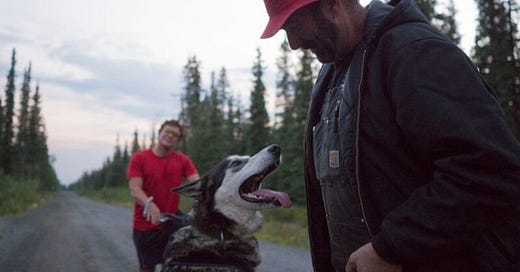Keys to Freeze, Mile 7215: What It Means to Be an Alaskan
Past dozens of rusting buses, trucks and cars, there’s a two-room house where a heartfelt handyman and his pet White Fang share road-kill sausage and local lore with weary travelers.
Photos by Reese Wells & Meredith Meeks
I awake to the sound of White Fang howling. It’s five a.m., and the sled dog is hiding in the fireweed. I rise from my bed in the front of an ’84 Denali bus, shoving off old and heavy covers, and make my way past the refrigerator and stove to look for whatever White Fang is barking at. Here in Tok, Alaska, it could be anything: moose, caribou, reindeer or bear.
I see White Fang through the window, standing on her shed in the pale light, and the fireweed about her glistening purple in the wet dew. Her body points east to the back of the complex, where the rusting hulks of 37 cars and trucks, five motorcycles, another Denali bus, and one airplane sit.
At the northern edge of the property sleeps our host, Carroll Johnson. He’s likely tucked away in his two-room wooden home, unaffected by White Fang’s yowling. Johnson’s garage, now closed to keep the mosquitoes out of the home, is littered with tools that would soon be used to fix one of his motorcycles…
Keep reading with a 7-day free trial
Subscribe to Narratively to keep reading this post and get 7 days of free access to the full post archives.





